The Floor is Lava: A Volio Taste of Volcanic Wines
By Giovanna Mazzotta, September 2023
From the slopes of Mount Vulture to the foothills of Etna, Italy boasts a treasure trove of vineyards nestled in the embrace of long-extinct volcanoes. These unique terroirs, shaped by the very forces that once sculpted the landscape, give rise to powerful wines that carry the spirit of the earth within every sip.
• The higher erosion of volcanic soils releases nutrients for the vine, allowing it to develop higher levels of polyphenols that directly increase wine structure and tannins.
• Volcanic soils are porous, they retain water in the winter and release it in dryer month when the vine needs it.
• Volcanic soils are rich in oxygen and resistant to phylloxera as a result.
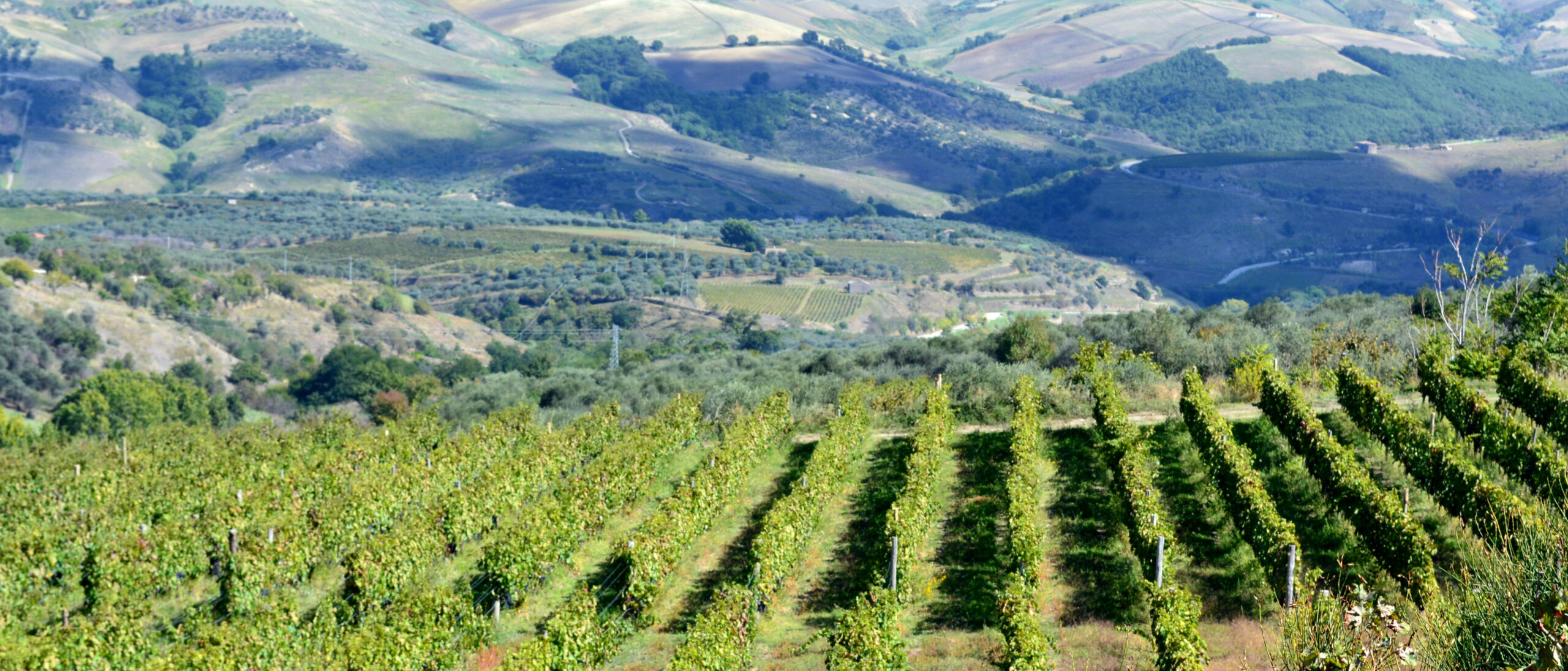
Part 1 – Aglianico del Vulture
Aglianico del Vulture is a prestigious Italian wine appellation located in the southern region of Basilicata. It encompasses the slopes of Mount Vulture, an extinct volcano. This small, diverse landscape allows for a focused approach to viticulture that emphasizes quality over quantity
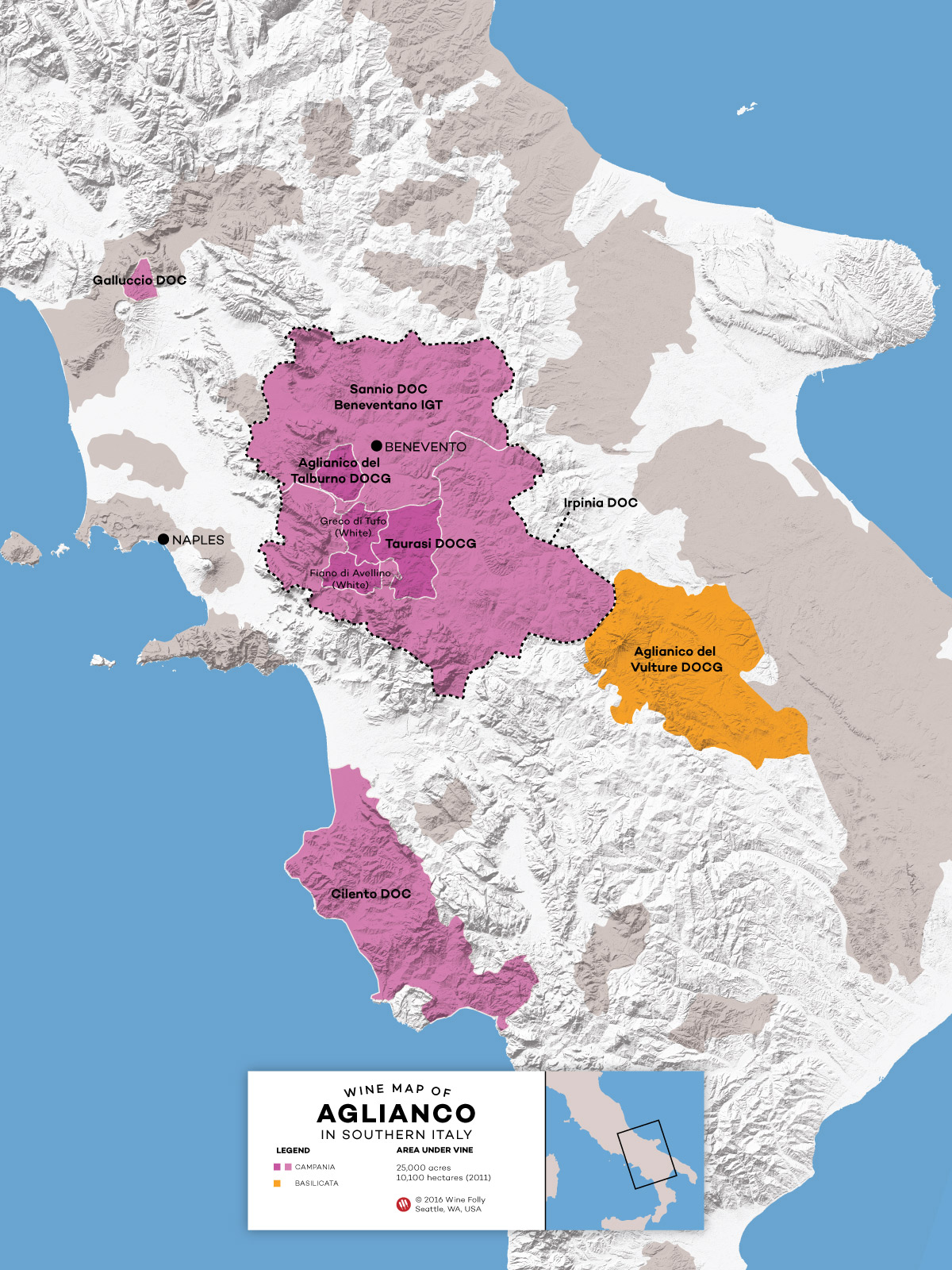
Image courtesy of Wine Folly
• 1200 hectares (2965 acres) of land
• Altitudes ranging from 400 to 800 meters (1300 to 2600 feet)
• Mediterranean climate – hot, dry summers, and mild winters
• Diverse microclimates that contribute to the complex range of flavors found in the wines
Above all, Mount Vulture stands as a dormant giant. Last active 11,700 years ago and now extinct, its geological history continues to shape the flavors and character of Aglianico del Vulture wines. The unique soil rich in potassium and magnesium contributes to the distinctive expression of the Aglianico grape, introduced by the Greeks in 800 BC. Considered the “Barolo of the South”, Aglianico wines are renown for complexity and nuance.
Aglianico del Vulture – adapting and thriving
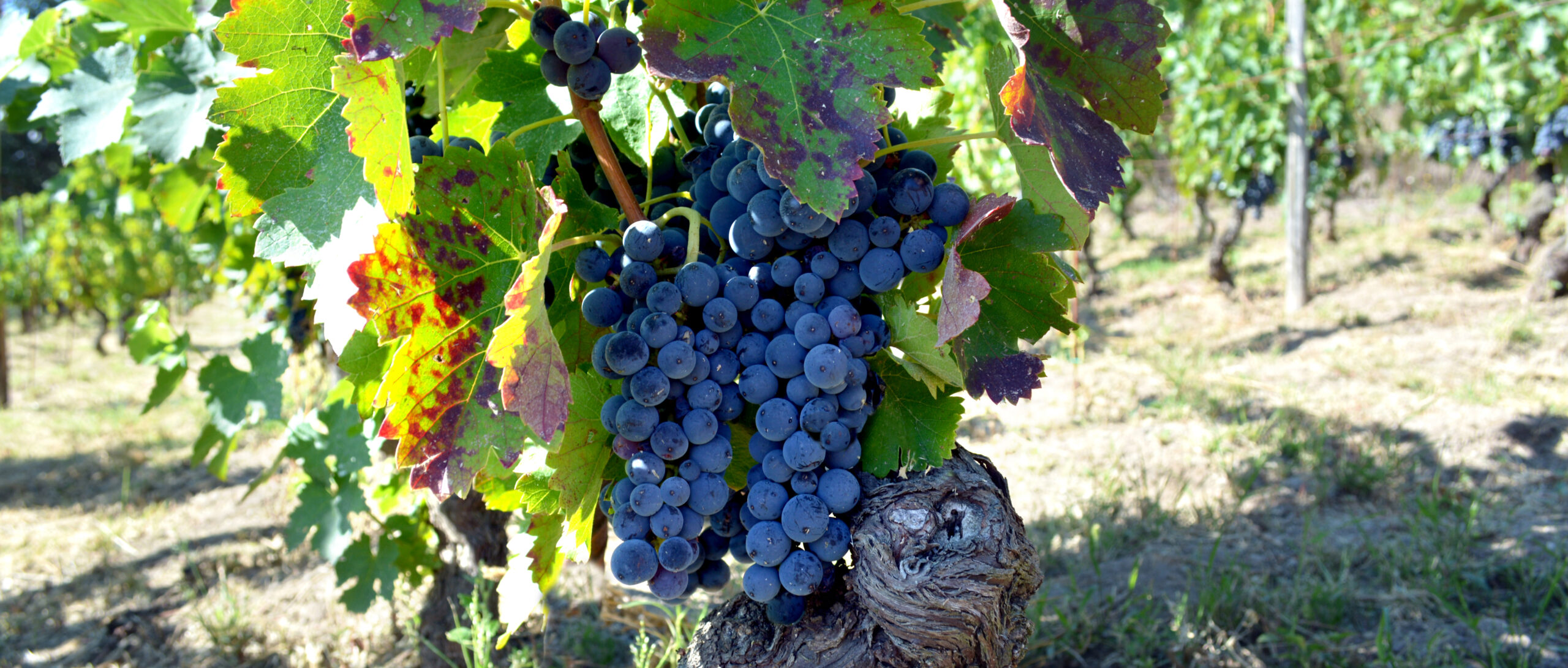
“Along with Nebbiolo and Sangiovese, Aglianico is generally believed to be one of Italy’s three best wine grapes, but in my opinion, it is far more: At the very least, it’s one of the world’s dozen or so best wine grapes.” – Ian d’Agata, Native Grapes of Italy
Aglianico is a late ripening red grape varietal that has adapted over the centuries to the local microclimate. In the hot July and August months it stops photosynthesis to conserve energy and doesn’t start ripening again until September. This prevents over maturation and leads to powerful wines that retain elegance and finesse.
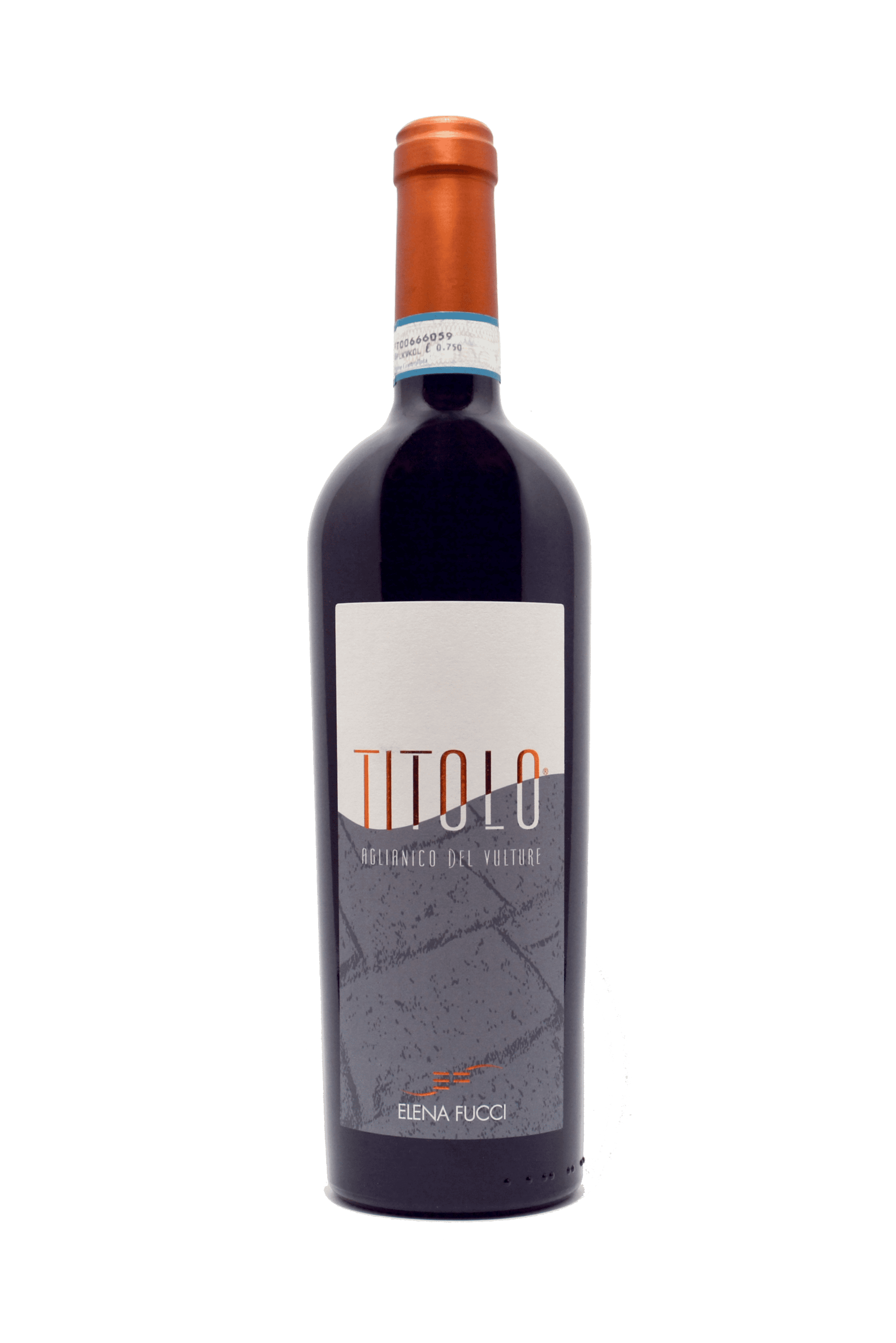
What Makes These Wines Unique
- Full Body
- High Acidity
- Firm tannins
- Balance of ripe fruit, earth tones, herbs, and minerality
- Extremely agreeable
Pair With:
- Roasted meats
- Game
- Grilled vegetables
- Aged cheeses
- Pasta dishes and rich sauces
Producer Spotlight: Elena Fucci
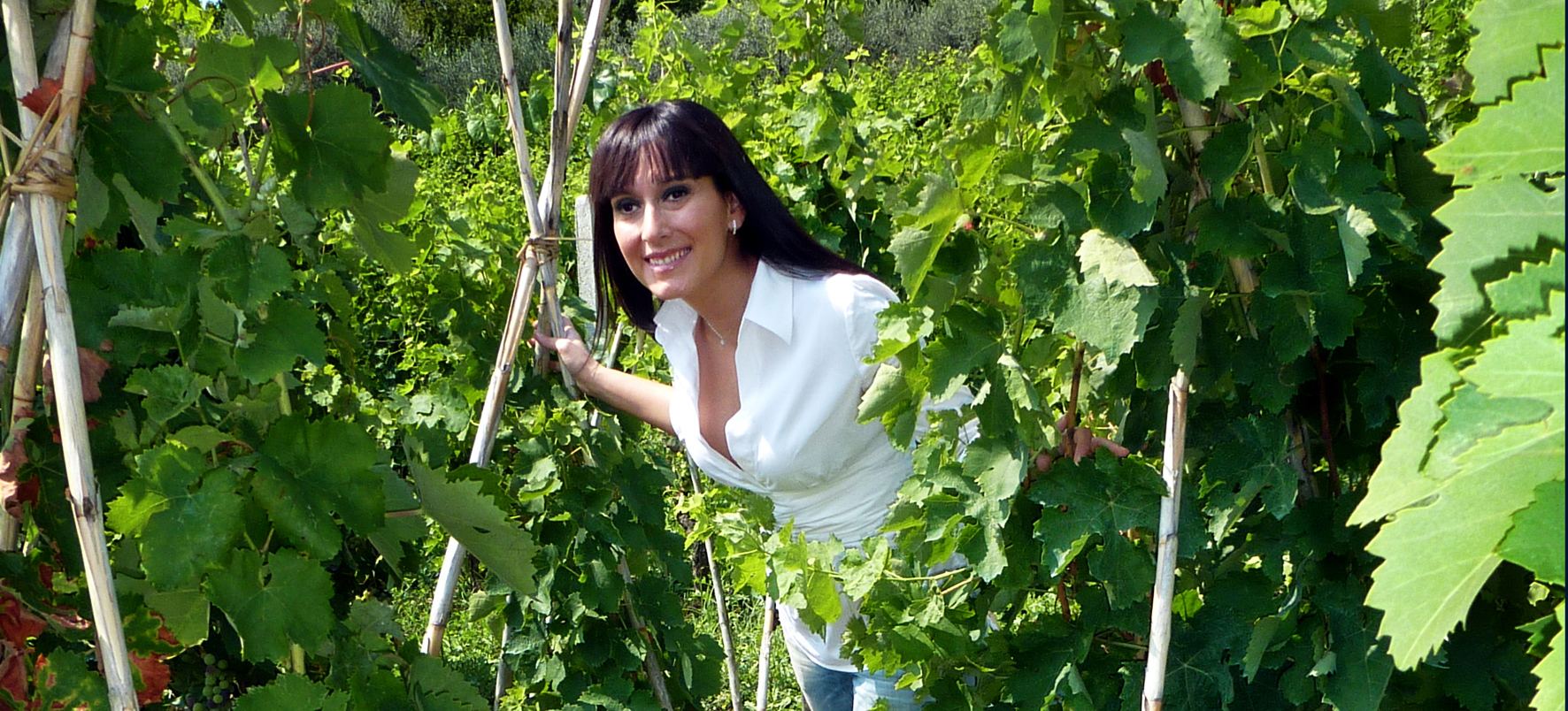
We couldn’t ask for a better guide in our exploration of Aglianico del Vulture other than Elena Fucci!
Elena took over her family’s winery in 2000 while studying enology at university and has since then become an icon and inspiration for women winemakers. In the past, grapes from Basilicata and other southern Italian regions were often used for bulk wine production. Elena is part of a group of eight winemakers committed to honor and enhance the unique identity of her beloved Aglianico; a sound choice, considering that these wines are now referred to as the “Barolo of the south”.
Elena describes herself as “modern, but not a modernist”, striving to follow traditional techniques in the vineyard supported by scientific innovation in the cellar. Her 6 hectares of land are entirely planted with Aglianico, with vines ranging from 55 to 70 years old on a particular type of volcanic soil called Pozzolana. The choice to train some vines using the traditional capanno method is a great example of Elena’s dedication to Aglianico’s viticultural heritage. This involves managing each freestanding vine using three canes that are regularly repositioned throughout the growing season based on the sun and wind. While this technique can be labor-intensive, the aim is to preserve it for educational purposes.
On the other hand, modern practices come into play at the cellar. Hand-picked grapes are lab tested and selected by an optical sorting machine, while maceration only lasts 15 days to manage the high tannins typical of the varietal. Elena is also dedicated to organic practices (they are certified organic), the original cellar was dug into volcanic rock, following ecodesign principles to minimize environmental impact.
Elena Fucci Wines

Elena Fucci Titolo Aglianico del Vulture
100% Aglianico
Vineyards nestled at the foot of Mount Vulture, at 650 meters of altitude. Rooted in a mixture of lava and ash locally known as “pozzolana,” the grapes derive their unique flavors from this mineral-rich land. Harvest begins in October and is conducted by hand.
Vinification is carried in stainless steel vats, followed by 12 months of ageing in 100% new French oak barriques, and 6 months of bottle rest.
Titolo appears dark and intense in color. The nose is complex with spices, cherry, blackberry jam, rosemary, tobacco, and cinnamon with light hints of vanilla. Dry on the palate and full bodied with firm tannins and a long finish. Although a young wine when released, it is destined for a great future!
Press
2019 – 94+ Vinous, 92 Wine Enthusiast, 91 James Suckling
2020- 95 Vinous, 91 James Suckling
Try this if you like full-bodied, highly tannic wines that can improve with age.
- Barolo
- Cabernet Sauvignon
- Northern Rhone Syrah
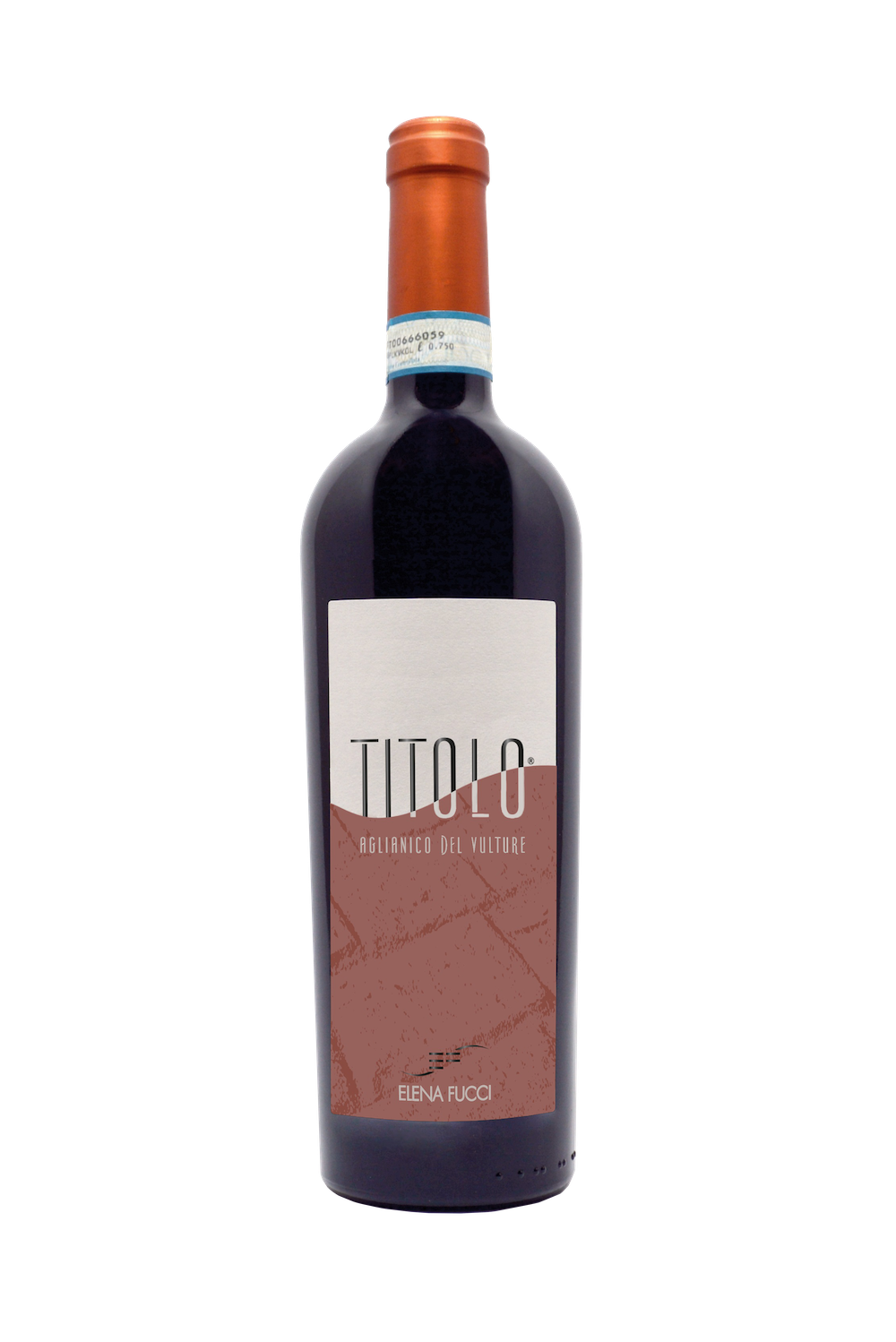
Elena Fucci Titolo by Amphora
100% Aglianico
Vineyards nestled at the foot of Mount Vulture, at 650 meters of altitude. Rooted in a mixture of lava and ash locally known as “pozzolana,” the grapes derive their unique flavors from this mineral-rich land. Harvest begins in October and is conducted by hand. Vinification and maturation is carried in amphorae, an age-old terracotta vessel. The resulting wine is intensely ruby with garnet reflections, with notes of peppers, currant, and tobacco. The body is structured, with vibrant minerality and sapidity.
Press
2019 – 93 Vinous, 92 Wine Enthusiast
2020- 94+ Vinous
Try this if you like vibrant tannins, spices, and natural wines.
